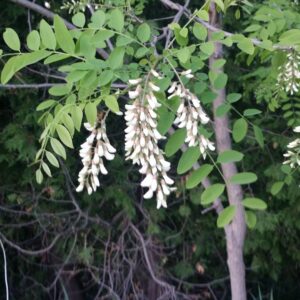Showing the single result
Wholesale Black Locust Trees in Michigan
Cold Stream Farm is a wholesale supplier of black locust trees, based in Free Soil, Michigan. Our black locust (Robinia pseudoacacia) transplants are available for shipment throughout the United States, with restrictions on deliveries to Massachusetts and trees over six feet tall. Currently, Cold Stream Farm does not impose a minimum order requirement for retail or wholesale black locust tree orders.
About Black Locust Trees (Robinia pseudoacacia)
Native primarily to the Appalachian Mountains and Ozark regions of the United States, black locust trees are also known as yellow locusts and false acacia. The plant is seen as an invasive species in parts of the country such as California and Massachusetts where the quickly propagating roots compete for the area’s water with native vegetation.
The plant has been naturalized in parts of Australia, with human propagation on nearly every continent.
What’s with the name?
The “black locust” tree did not get its name for attracting grasshoppers but rather is named after another tree. First discovered and classified by Jesuit missionaries, British colonists settled near Jamestown named the plant “black locust” due to its resemblance to old-world locust plants. The plant is related to both bean and pea species.
How to Spot a Black Locust Tree
Typical black locust trees will reach a mature height between 40-80 feet. The thick central trunk can be up to 4 feet in diameter and gives the species its “black” nickname with dark, thick bark. The tree’s crown spreads with branches full of dark blue-green leaves and seasonal white flowers.
Black locust trees can be most easily identified by pairs of thorns at the base of each leaf. Their branches sprout in “zig-zags” and feature small, legume fruits that mature in the autumn and cling to the plant throughout the winter.
Best Growing Conditions for Black Locust Trees
Black locust trees require full sun and do not handle shade nearly as well as many other deciduous species. The plants tolerate drought very well and grow best in USDA hardiness zones 3 through 9.
Growing in a wide variety of soils, black locust trees are most successful in dry and sandy conditions where other plants could not thrive. If left unkempt, a black locust plant will spread through underground shoots or root suckers.
Uses for Black Locust Wood
Within the dark bark, the wood from a black locust plant is palish yellow, closely grained, and very durable. Naturally resistant to infections and rot, black locust wood is popular in furniture, flooring, fencing, and boats. It is widely considered as one of the most durable woods naturally found in the United States.
As a quick-growing, and slow-burning wood material, black locust is popular as a great option for firewood. The dense wood does not emit large flames or billows of smoke and can even burn well when wet.
Black Locust Plants as Food and Medicine
In traditional European and Indian medicine, various parts of black locust plants have been used as a diuretic and laxative. The flowers are edible if cooked and have been eaten as jams, beignets, and tempura around the world.
Today, it is possible to batter and deep fry the flowers for a somewhat sweet treat. The plant is also used to produce honey in both the United States and Europe with many cultivars featuring different colors and traits.
Warning: Toxic Tree
Despite its use in food and medicine, it is very important to know that the wood, bark, and leaves of a Robinia pseudoacacia tree are toxic to livestock and humans if consumed raw. Horses that have ingested black locust plant parts should seek immediate attention from a veterinary professional.
Other Uses for Black Locust Plants
In addition to all of the uses for a black locust’s bark and flowers, the plants themselves are often intentionally added to an area for erosion control or shade development. The highly tolerant plants can withstand most urban settings and are often placed ornamentally within an exterior space.
Most commonly, black locusts plants are used to quickly add shade and structure to a new wildlife area. This includes roadsides, protected areas, and mining reclamations.
Ecology and Wildlife Interactions
The seedpods of a black locust plant attract many wildlife species including deer, birds, squirrels, and more. In particular, Robinia pseudoacacia is a great source of food for song and game birds such as quail, grouse, turkey, and pheasant. The thorny leaves also offer protection for small mammals hiding from predators within the tree’s branches.
Purchase wholesale black locust with Cold Stream Farm.
To get started with your shipment, please check our current availability of black locust plants. We supply retail and wholesale black locust trees with limited availability on transplants of various sizes. Please contact us today if you have any questions about your order or local regulations. Deliveries can be arranged at no minimum order quantity and packaged alongside other shrubs or flowering plants.


